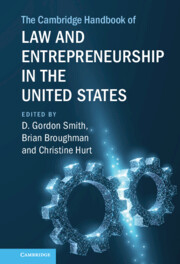The Cambridge Handbook of Law and Entrepreneurship in the United States
Law plays a key role in determining the level of entrepreneurial action in society. Legal rules seek to define property rights, facilitate private ordering, and impose liability for legal wrongs, thereby attempting to establish conditions under which individuals may act. These rules also channel the development of technology, regulate information flows, and determine parameters of competition. Depending on their structure and implementation, legal rules can also discourage individuals from acting. It is thus crucial to determine which legal rules and institutions best enable entrepreneurs, whose core function is to challenge incumbency. This volume assembles legal experts from diverse fields to examine the role of law in facilitating or impeding entrepreneurial action. Contributors explore issues arising in current policy debates, including the incentive effect of legal rules on startup activity; the role of law in promoting or foreclosing market entry; and the effect of entrepreneurial action on legal doctrine.
- Develops an analytic framework based on the notion that the core function of entrepreneurs is to challenge incumbency
- Provides a broad view of three domains in which law affects entrepreneurial action: lawmaking, governance, and incentives
- Offers perspectives from subject-matter experts in a variety of legal specialties
Product details
April 2022Hardback
9781107171954
600 pages
235 × 156 × 20 mm
0.56kg
Available
Table of Contents
- Introduction D. Gordon Smith and Brian Broughman
- 1. Entrepreneurial action D. Gordon Smith and Travis Hunt
- Part I. Regulating, Lawmaking, and Entrepreneurial Action:
- 2. The rise of regulatory affairs in innovative startups Elizabeth Pollman
- 3. Gauguin, Darwin and design thinking Alice Armitage
- 4. Between the devil and the SEC Usha Rodrigues
- 5. The politics of entrepreneurial capital-raising Donald C. Langevoort
- 6. Venture exchange regulation: listing standards, market microstructure, and investor protection Jeff Schwartz
- Part II. Governance and Entrepreneurial Action:
- 7. Relational contracting and business norms in entrepreneurial finance Brian Broughman
- 8. Biotech strategic alliances in law and entrepreneurship D. Daniel Sokol
- 9. The entrepreneurial business judgment rule Andrew Gold
- 10. Entrepreneurial action in family-controlled companies Benjamin Means
- Part III. Legal Incentives Supporting (and Sometimes Discouraging) Entrepreneurial Action:
- 11. Entrepreneurship incentives for resource-constrained firms Susan C. Morse
- 12. Corrupting entrepreneurial action Joseph W. Yockey
- 13. The spinoff advantage: human capital law and entrepreneurship Orly Lobel.




